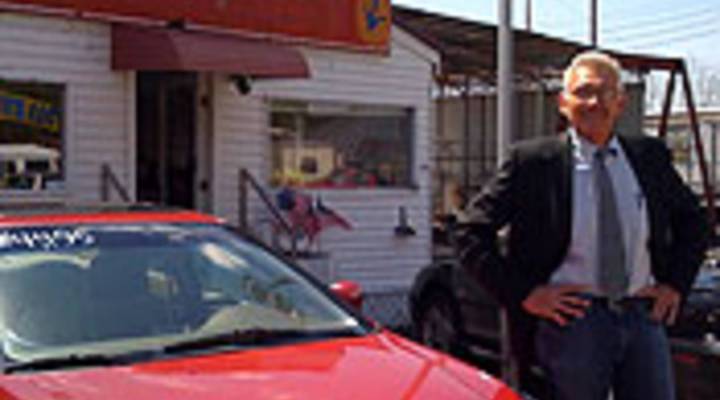
A little optimism on the economic road

TEXT OF INTERVIEW
Ryssdal: Amy Scott and Tess Vigeland have been out away from their desks this week. They’re re-tracing their cross-country travels from last fall. That’s when we sent them out to see whether Wall Street had set this country on the Road to Ruin. They get to come home this weekend. But first we’ve got them on the line to see what they’ve learned while they were out there. Tess, you first today, where’d we find you?
Tess Vigeland: Kai, I am in St. Louis, where as you all remember, the three of us met up just six months ago. I spent yesterday talking to some students at Washington University about credit card debt, because of course, the credit issue has loomed large over this entire financial mess.
Ryssdal:Amy, last we heard from you, you were in Youngstown, Ohio, where’d we track you down today?
Amy Scott: Well, now I am in Cincinnati. You must remember Mort McArthur.
Ryssdal: I do, yeah. The car guy, right?
Scott: That’s right. He owns a small used car dealership called Mort’s Imports here in Cincinnati. I first met him on the road trip last fall, and then you checked back in with him around the beginning of the year. And this is what he told you back then:
Mort McArthur: If things have not brightened by March, then I will probably start the process of shutting down, or just going wholesale.
Ryssdal: All right. So here we are. My calendar says April, so how’s he doing?
Scott: He is still in business, but it is slow. His, you know, customers are still having a hard time getting loans, and of course, more people are out of work now. We just learned today that the unemployment rate in Ohio is getting close to 10 percent, the highest in 25 years. Now tax refund season has helped McArthur out a bit; a lot of people buy cars when they get that extra cash in their pockets. And he’s also changed the way he does business.
McArthur: I’ve lowered my inventory; I don’t carry as many cars, as you can see. I’ve lowered my advertising. I’ve tried to just cut back, because the economy has shrunk — I’ve got to shrink if I want to stay in the economy. So I’ve got to be doing something different.
Scott: Now I should say that McArthur hasn’t paid himself a salary in several months. That’s one of the ways he’s staying in business. He’s cut back costs to the point where the business is at least paying for itself now. He figures he can get by for maybe another year on his savings until the next tax refund season. But keep in mind, this is a guy whose cell phone ring tone is “Here Comes the Sun.”
Ryssdal: Oh man. Yeah, I was going to say he does sound pretty optimistic for a guy who’s clearly in a lot of trouble right now.
Scott: That’s right. He is.
Ryssdal: Tess, what about you? Were people on your path this week optimistic? Or maybe not?
Vigeland: You know, I think there is a lot of optimism. What I found in Utah and Nebraska, here in Missouri, you know, on the surface there are no big changes for the folks I talked to. Lives are going on. But I think long-term plans are what’s changing. You know, we heard from Melody and Dave Landis in Lincoln, Neb., wondering if they’re going to be able to retire. Their son is worried about the future of his job. Our friends at the barber shop here in Missouri are waiting to jump back into the stock market. They don’t know when they’ll feel comfortable doing that. So, I think these kind of conversations are going on throughout the country in various iterations.
Ryssdal: Amy, what about you and the mind set? I mean, taking Mort McArthur on one end, and then your experiences in Youngstown on the other end, I mean, how are people feeling?
Scott: Right. Well it was a very different story there, of course. On Wednesday I spent a few hours at an event for laid-off workers and other people who are in financial trouble. And, you know, I’m talking to people who have lost jobs in industries that are just collapsing. So they’re feeling like they don’t have a lot of options, except maybe to move out of the area or go back to school to learn a completely different skill. So while I did hear a lot of optimism out there, also some genuine distress.
Ryssdal: Amy Scott and Tess Vigeland have been revisiting to Road to Ruin for us. I don’t know guys, maybe we’ll send you out again in six months. What do you think?
Vigeland: Happy trails.
Scott: I’d love to do it.
Ryssdal: All right. Amy Scott and Tess Vigeland, thanks a bunch.
Scott: All right. Thank you.
Vigeland: Thanks, Kai.
There’s a lot happening in the world. Through it all, Marketplace is here for you.
You rely on Marketplace to break down the world’s events and tell you how it affects you in a fact-based, approachable way. We rely on your financial support to keep making that possible.
Your donation today powers the independent journalism that you rely on. For just $5/month, you can help sustain Marketplace so we can keep reporting on the things that matter to you.












